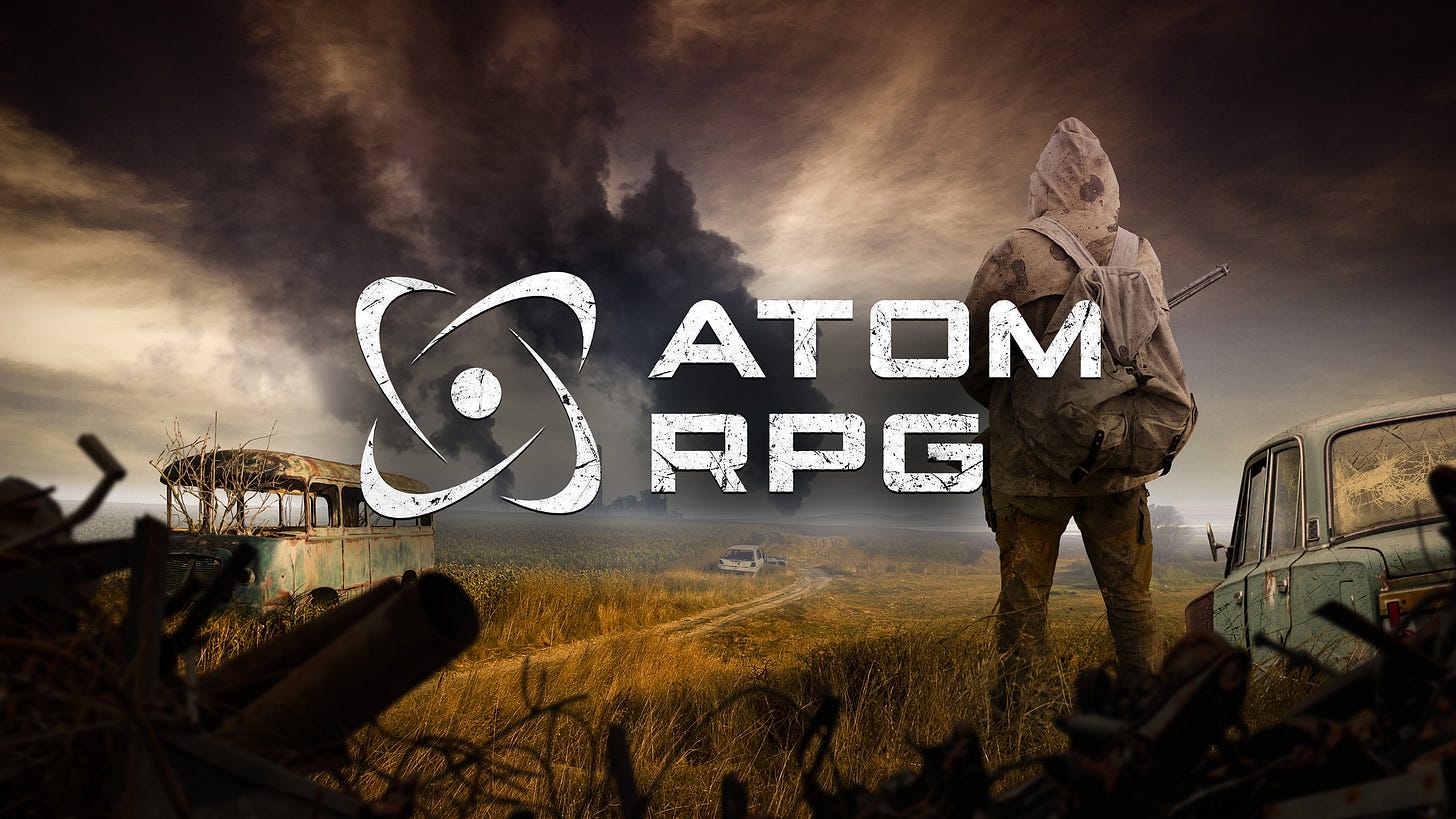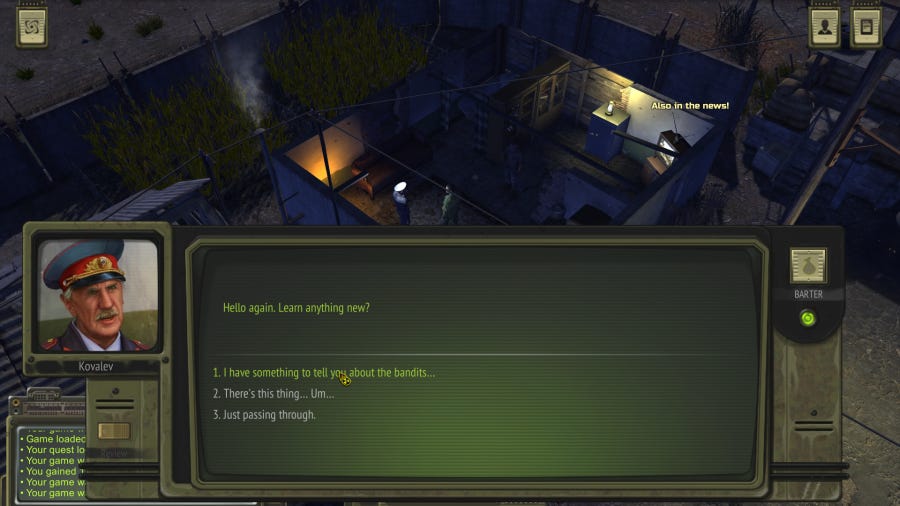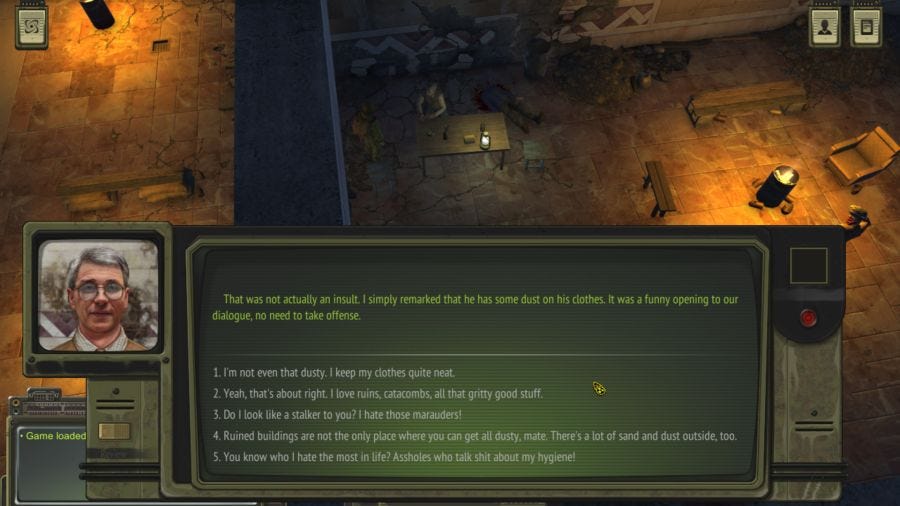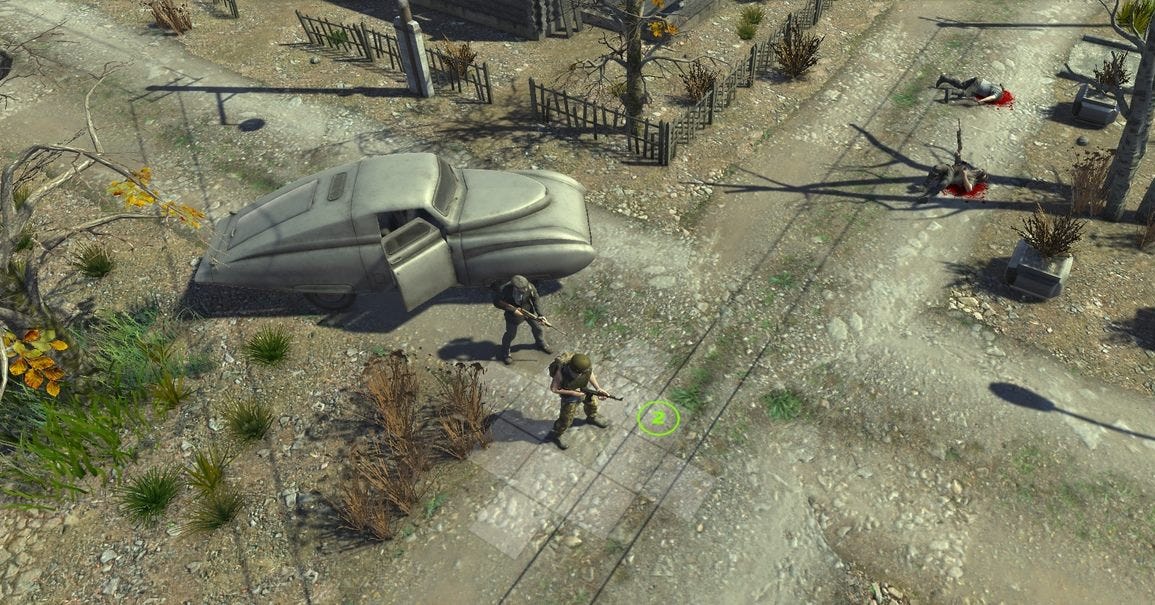Developer: Atom Team
Publisher: Atent Games
Director: Anton Krasilnikov
Scenario: Alexander Chernyavskiy, Anton Krasilnikov
Art direction: Vladimir Demchenko
Soundtrack: Evgeniy Bagatiy
Subgenre: Isometric turn based CRPG
Progression: the game offers plenty of freedom for those interested in exploring its world and delving into its subquests, despite its story actually being fairly railroaded in terms of its narrative, with choices mostly influencing how the character handles the various events, rather than completely changing the story’s progression
Countries: Latvia, Poland, Russian Federation, Ukraine
Platform: PC, PS4, XBO
Release Date: 6\4\2022
Status: Completed on 22\2\2024
While the golden age of Kickstarter-funded Western RPGs did last from 2012 to around 2014, with games such as Wasteland 2, Pillars of Eternity and Torment: Numenera reaching their objectives and then burning through multiple stretch goals, even in 2017 there was still hope for interesting indie projects like Atom RPG, an homage to the first two Fallouts created by a post-Soviet/Warsaw Pact team made up of Latvian, Polish, Russian and Ukrainian developers led by Anton Krasilnikov.
Having developed a soft spot for Eastern European RPGs since the ‘00s, when I had a chance to tackle titles such as Pathologic, STALKER, The Witcher, Hard to be a God, Konung, Two Worlds and others, I found myself drawn to this peculiar strand of RPGs a number of times in the last few years, thanks to titles like Chernobylite, The Life and Suffering of Sir Brante and Disco Elysium, after which I felt it was finally time to explore the post-apocalyptic Soviet landscape painted by Atom Team, which, by then, had already spawned a sequel, Trudograd.
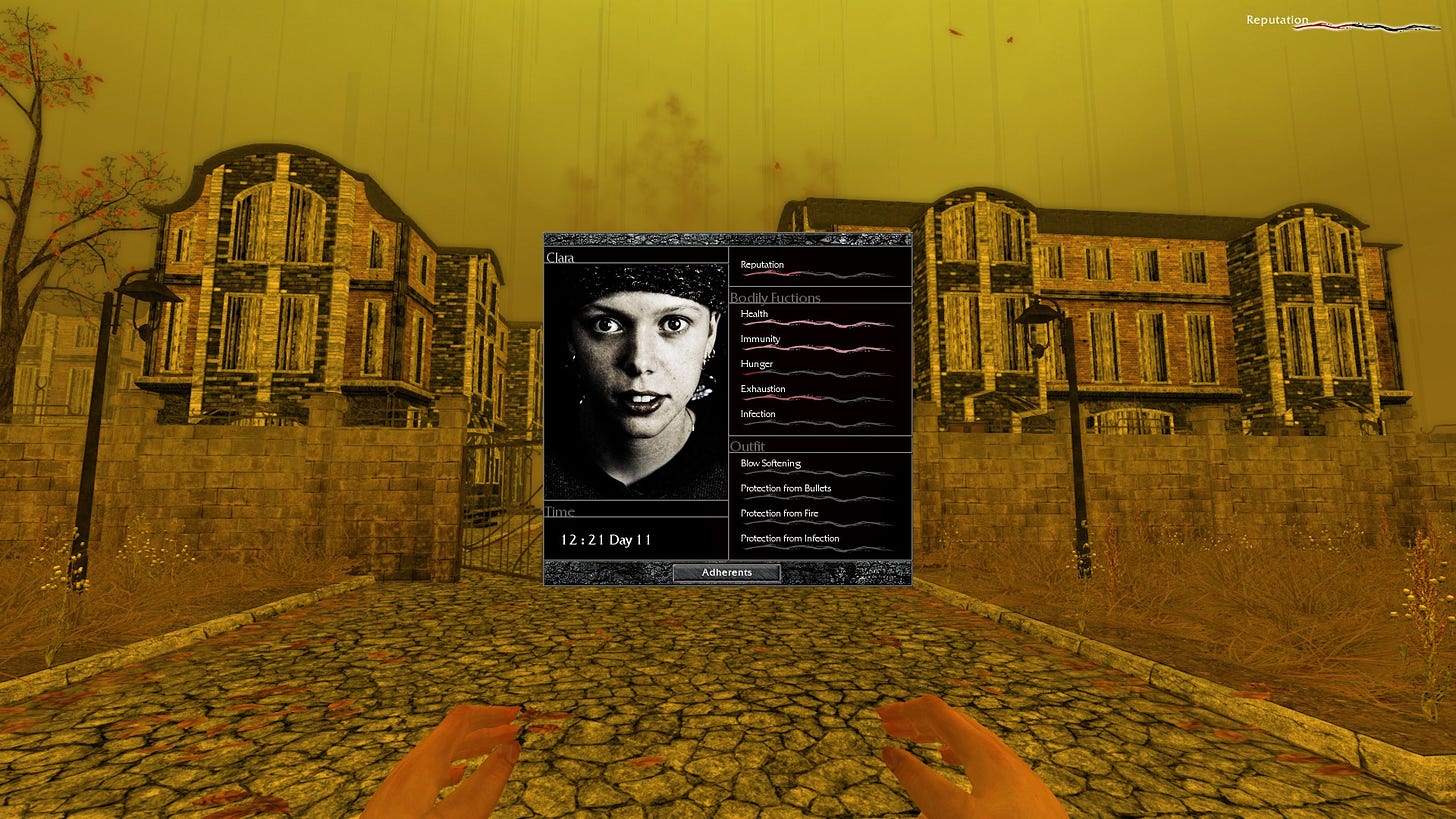
Set in an unspecified part of the south-western Soviet Union after a nuclear war devastated the planet and eliminated any semblance of authority, Atom RPG kicks off in a secret base housing a team of surviving Soviet operatives, the Atom team, tasked with reestablishing civilization in case a nuclear fallout ended up eliminating central control, throwing the Motherland into chaos and lawlesness.
Tasked with finding a squad of missing Atom soldiers and unveiling the mistery behind their disappearance, our protagonist can be fully customized by assigning points to their main stats and skills while also choosing a number of optional Distinctions, which provide both perks and drawbacks while fleshing out your character even more. In the post-atomic wasteland, though, stats and skills are far from being born equal, and the game blatantly favor specialized builds over all-rounders, with combat-related stats like Endurance and Dexterity being almost mandatory given how frequent battles end up being.
Despite being part of an elite force, the brutal reality of the wasteland immediately hits the character as soon as they leave the Atom base, with a number of brigands robbing them of all their equipments while still mercifully leaving them alive, having to start back from scratch near a small hamlet where the conflict between a local community, divided between surviving Soviet mores and the need to adapt to the wilder times they’re living in, and a nearby band of criminals risks spiraling down into a bigger crisis, and that’s just a tiny part of the area we will get to explore before finally starting to piece together the details of the mission we were originally ordered to pursue.
In a post-mortem interview released soon after I completed his game, ATOM director Krasilnikov claimed that ATOM wasn’t just influenced by the old Fallouts, but also wanted to celebrate Eurojank RPGs, a derogatory term that has turned into an endearing label including quite a number of French, German and East European titles, united by the attempt to marry grand ambitions with not-so-grand budgets.
This is definitely true for ATOM, too: while Krasilnikov was humble enough to admit he also went for an Eurojank feel because he knew his first major RPG development effort couldn’t aim for an higher level of polish, this foray into the post-Soviet wastelands is filled to the brim with passion, a unique Eastern European dour humour (including fairly obscure Russian internet jokes that were made even more cryptic when localized in English) and a rich variety of situations that makes its sandbox feel appealing and immersive, making the player quickly lose interest in the protagonist’s main task while pursuing dozens of completely unrelated quests all over the wastes, or just exploring for curiosity’s sake.
Hidden behind hundreds of unique NPCs with their own names and stories, apparently inspired by the Ultima series, showing how well read RPG-wise Krasilnikov and his friends were, there are literary references to weird horror short stories just as much as the Strugatsky brothers’ Maksim Kammerer series (Eastern Europeans RPGs can’t really escape their influence, after all, like with the abovementioned STALKER and Hard to be a God), not to mention countless political commentaries heavily reminiscent of the Perestrojka and post-Soviet periods (you even have to help set up an election the local crime syndicate is trying to railroad), even if the game’s rather meandering writing doesn’t make the best out of those inspirations.
In fact, reading many of those uniquely hopeless and yet quirky interactions often reminded me of the lyrics of late Viktor Tsoi, of Leningradian new-wave group Kino, which I discovered some years ago and who, with songs such as Conchytsya Leto (Summer is ending), was a powerful influence in forming my own understanding of late Soviet popular culture. While the developers never commented on this, one gradually gets the impression that, rather than being a Soviet-themed rehash of Fallout’s post-apocalyptic satire, most of Atom RPG’s narrative is actually a subtly tragicomic commentary on the end of the Soviet Union and on the variety of crises that ensued afterwards on a political, social and economical level, encompassing modern Russian-speaking popular culture.
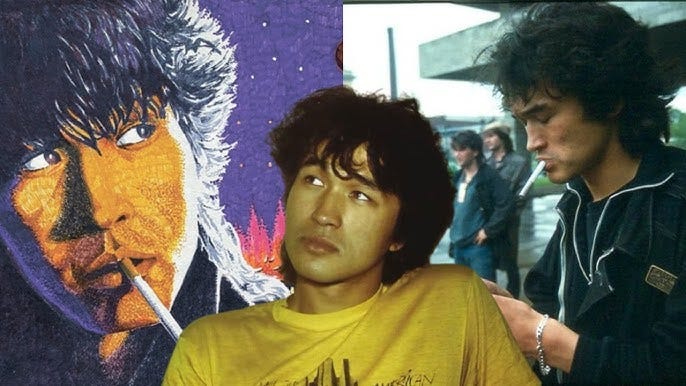
Atom’s satire can be both subtle and crass, with bureaucrats acting as gangsters while gangsters try acting like bureaucrats, and that’s before you meet a member of a cult treating Lenin as a sort of mix of Communist deity and shamanic manifestation of primal forces, with some references suspiciously reminiscent of Warhammer 40k’s lore regarding the Emperor’s ancient genesis, ordering you to reclaim a holy statue of Lenin from a horde of bourgeois mutants.
Completing the quest awards your character a red chainsaw called Lenin’s Wrath, inscribed with arcane phrases from the Communist Manifesto and, honestly, that was the only way a story like that could end.

While its writing can definitely be interesting on a thematic level, as mentioned it’s hard to consider Atom RPG a well-written game in a traditional sense: lots of interactions feel meandering, the few recruitable party memeber have little meaningful to add and their quips, especially in the story’s most pivotal moments, tend to feel like artificial grafts into a script that didn’t foresee their presence, rather than organic parts of a conversation, not to mention how the game’s own tone sometimes ends up sabotaging its narrative, even if one feels like this could actually be intentional.
This doesn’t mean those characters couldn’t have been interesting, if they had been developed a bit more: ATOM-aligned Cuban enthusiast Fidel, crazy Soviet writer Hexogen (who seem to be a walking commentary on the peculiar synthesis between the Soviet and Tsarist-era parts of post-Soviet Russian national identity, due to his shifting, almost syncretistic ideologic allegiance), Soviet-Afghan war veteran Alexander (who made me think about yet another late Soviet musical niche, Afghan war-related songs like Kaskad’s sad Farewell, mountains) and a bizarre secret character (possibly inspired by tabletop RPG LARPers) that only joins if your character become a murderous villain could have actually been memorable, if they hadn’t felt like an afterthought for most of the story, foregoing to comment even during a number of dialogues that were thematically a great fit for their involvement.

In the end, loyal Dzhulbars, a Dogmeat-inspired recruitable dog companion that can don his own unique special armor and ends up fighting better than some combat specialists, is easily the best ally in a variety of ways, part of a long line of canine party members featured in RPGs such as Secret of Evermore, Final Fantasy VII, Suikoden 3, Persona 3, Dragon Age Origins, Tales of Vesperia and Final Fantasy XVI, among others, not to mention all the Dogmeats featured in the Interplay and Bethesda Fallout games.
Aside from its freeform exploration and large variety of optional quests and contents, Atom RPG’s main story is actually fairly linear, like in Fallout itself, with some variety regarding the ultimate outcome depending on a number of choices in the very last stretch (again, with a rather blatant callout to Interplay’s classic in the way the final encounter can play out). Then again, exploring the world can be more than a bit time consuming, making the sidequest related to getting your own car incredibly relevant, even more so considering the additional inventory space it ends up providing. Even so, though, unfortunately the way to obtain the fabled GAZ SG-1 limo can be quite misleading, and I ended up thinking I was pursuing it while I was actually helping out an old Soviet officer.
While its turn based combat built around a tried and true action point system is a rather pleasant affair in its nostalgic simplicity, as in the original Fallout Atom RPG’s difficulty is also easy to break as soon as you’re able to face the random bandits roaming the land: while initially they can feel daunting, slowly building your arsenal and armor makes them approachable enough to finally defeat some of the high-tier gangs, netting an astounding amount of resources and equipment and giving way to a positive loop that trivialize most of the challenges you can find in the post-Soviet wasteland.
Even then, the game’s last stretch can prove to be quite brutal if your team isn’t up to par, and here stealing can definitely save the day, with incredibly overpriced equipments making all the difference and a band of fellow Atom operatives becoming easy marks to find some extremely useful grenades which, again, felt to me like a somewhat deliberate commentary.
In the end, while Atom RPG’s systems and overall loop are undoubtedly very iterative and its uneven script and poor characterization aren’t able to match the potential of its themes and setting, there are times when one ends up thinking those issues could be actual design choices meant to push a fascinating, if noticeably flawed, package that ultimately felt endearing to me exactly because of its unabashed adherence to its sarcastic, dour and very much Eurojank vision.


